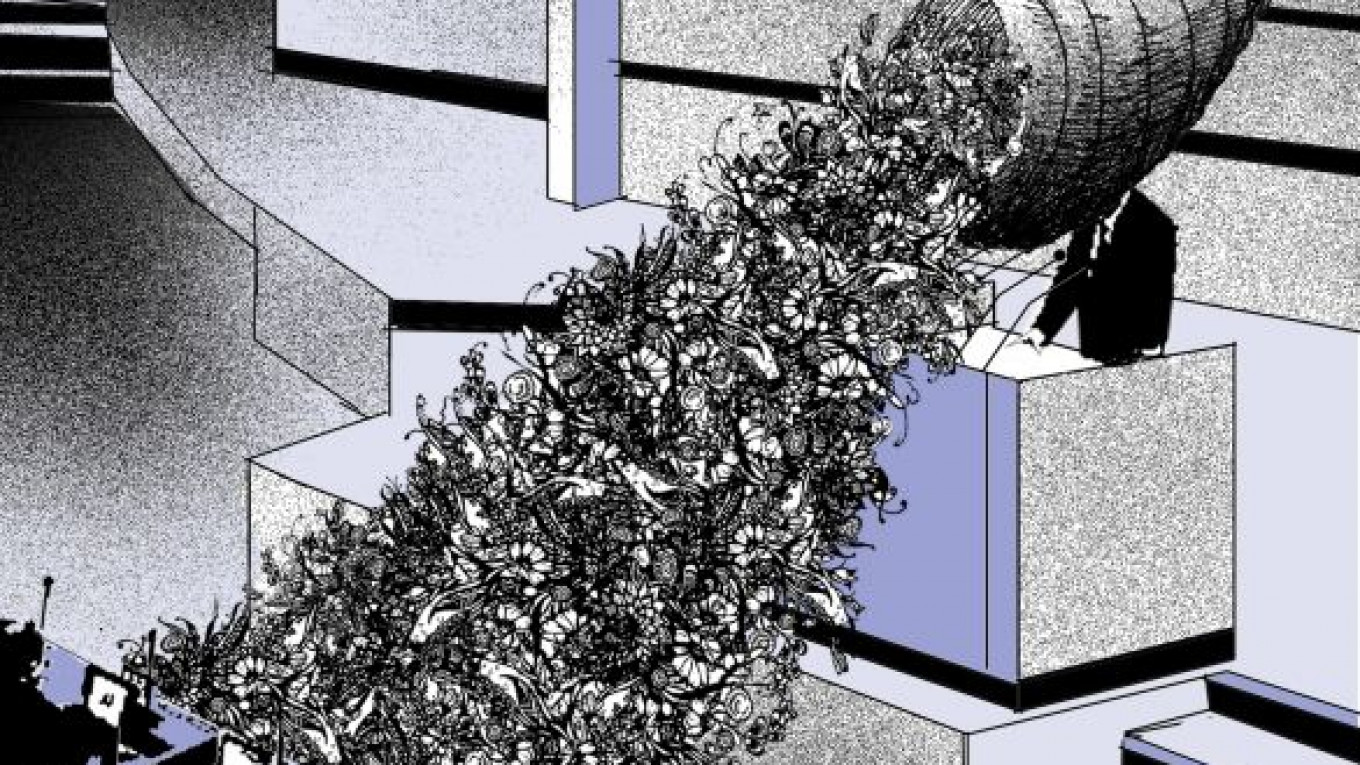President-elect Vladimir Putin's speech before the State Duma last week was his first major public address after being elected in March. He used the occasion to sum up the accomplishments of his Cabinet over the past four years and to outline his future plans as president.
Overall, Putin said nothing new. For the umpteenth time, he promised to resolve Russia's longstanding problems of corruption, social stratification, bad roads, bloated bureaucracy, terrible investment climate and the economy's overreliance on raw materials exports. These are the same problems he promised to tackle when he was first elected president in 2000 and that have only grown worse during his 12 years in power.
Putin characterized his past four years as prime minister as a string of solid achievements and successes, conveniently overlooking the fact that Russia's main competitors — fellow BRIC members China, India and Brazil — achieved much greater progress and growth during the same period. He also made it clear that he would not accept any changes to the political system, nor did he propose a single institutional reform, even though it is clear that Russia's underdeveloped institutions are its main barrier to development.
Putin has rejected all of the main demands made by the tens of thousands of angry, educated middle-class citizens who turned out for street protests between December and March.
Putin's declaration that he will work constructively with the Duma "throughout its entire constitutional term" is a clear rejection of the protesters' demands for early Duma elections open to all opposition forces. It also signaled Putin's unwillingness to investigate thousands of documented incidents of electoral violations.
Putin's reaction to the political crisis in Astrakhan is perfectly consistent with these positions. In Astrakhan, A Just Russia candidate Oleg Shein blamed massive electoral fraud for his loss in the mayoral race to United Russia candidate Mikhail Stolyarov and is holding a hunger strike along with supporters that has been in effect since March 16.
When asked about his view of the situation by a deputy from A Just Russia during his Duma address, Putin gave his standard scoffing response that protesters should take their case to court. It is no secret that the country's courts are partial and that previous attempts to file lawsuits against officials for electoral fraud have been summarily dismissed by judges without even examining the evidence. Upset over Putin's mockery of the protesters, Just Russia members abruptly walked out of the Duma.
Before Shein went on a hunger strike, he filed complaints with the Central Elections Commission, but he quickly learned that this was useless. The majority of the commission's members are from United Russia, and roughly one-third are appointed by the presidential administration. The elections commission's only response was that the electoral violations in the Astrakhan mayoral race were minor and could not have influenced the final result. The Prosecutor General's Office took the same stance.
Putin is basically telling Russians: "The elections are over. Accept the results and forget about it." Opening a transparent and impartial investigation into claims of election fraud in Astrakhan would clearly open a Pandora's box. If this process were to start, investigators would quickly find egregious violations and fraud in almost every region and city of the country. That is why the authorities are so rigidly opposed to the protesters' demands, even when the health and very lives of the hunger strikers is at stake.
None of this bodes well for Russia. Both the authorities and the protesters continue to raise the stakes. Putin stubbornly adheres to his authoritarian style of ruling the country, while protesters have no other choice than to resort to desperate measures, such as hunger strikes and unauthorized demonstrations, to achieve their goals. This is a dangerous trend because it could potentially escalate into a violent conflict.
Putin has no intention of reforming the political system of the country. He likes the idea of applying a double or even a triple filter to gubernatorial elections. He thinks the ruling authorities should continue to decide which parties are acceptable and which are not. Putin sees no problem with widespread police abuse, the harassment of individuals opposed to his regime and the growing number of political and business prisoners of conscience who are locked up in the country's prisons. He denies the existence of massive electoral fraud, refusing to incriminate anyone who falsifies results in favor of himself or his party. What's more, Putin said any limitation on presidential terms would not apply to his next 12 years in power.
All of this means only one thing: Russia can expect a period of increased political tensions, civil confrontations and, God forbid, violence.
Vladimir Ryzhkov, a State Duma deputy from 1993 to 2007, hosts a political talk show on Ekho Moskvy radio and is a co-founder of the opposition Party of People's Freedom.
A Message from The Moscow Times:
Dear readers,
We are facing unprecedented challenges. Russia's Prosecutor General's Office has designated The Moscow Times as an "undesirable" organization, criminalizing our work and putting our staff at risk of prosecution. This follows our earlier unjust labeling as a "foreign agent."
These actions are direct attempts to silence independent journalism in Russia. The authorities claim our work "discredits the decisions of the Russian leadership." We see things differently: we strive to provide accurate, unbiased reporting on Russia.
We, the journalists of The Moscow Times, refuse to be silenced. But to continue our work, we need your help.
Your support, no matter how small, makes a world of difference. If you can, please support us monthly starting from just $2. It's quick to set up, and every contribution makes a significant impact.
By supporting The Moscow Times, you're defending open, independent journalism in the face of repression. Thank you for standing with us.
Remind me later.








